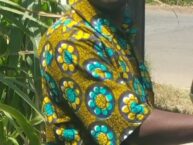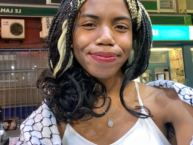 Rumbi is a recent graduate of Cambridge University. She is a consultant by day and storyteller by night. She has been writing this story since August 2008 and has made many promises that she will write it into a novel one day. She writes for youngzim.com and afropean.com.
Rumbi is a recent graduate of Cambridge University. She is a consultant by day and storyteller by night. She has been writing this story since August 2008 and has made many promises that she will write it into a novel one day. She writes for youngzim.com and afropean.com.
The Other Jacarandas
You were sat in Chido’s hair salon when you first found out your husband had a mistress, because salons are places where gossip is delivered each morning like baby Moses, swaddled in countless people’s boredom, malice and the normalcy of knowing everything about everyone’s business. Privacy was a luxury that couldn’t be afforded people who scrambled 22 into a commuter omnibus and whose houses sat so close to each other that one person’s private business could easily be confused with next door’s TV or radio as evening entertainment. It was in this way that news of your husband’s mistress was delivered into the salon that evening, like a communal plate of sadza that everyone within earshot feasted on.
“She’s a simple girl from the village. Chokwadi, it’s true. As simple as simple can be. Ask Shorai, she knows the girl.”
“Ehe.” Shorai didn’t look at you. For the first time that evening her client’s hair got undivided, careful attention. “She’s a simple girl from the village.”
You pretended to have missed the hesitancy in Shorai’s voice and the way her eyes darted around your face for the rest of the evening, but never actually settled on your face. She did not look in your eyes. Some deeply buried well rose up from somewhere inside your stomach until it engulfed your head and then the rest of your body and you were not drowning so much as surrounded. Protected. You were separated from everything around you, looking at the curlers going into your head with blurry eyes. A woman sitting under one of the hairdryers looked like a moon-woman, an alien, and you laughed a little too loudly at the joke only you knew. Shorai’s eyes darted somewhere near your face, and she pursed her thin lips, flicking her eyes at you every two seconds and sewing a weave into a large woman’s head. The large woman did not seem disturbed at the needle that came close to her scalp, directed by an arm that had the precision of a machine and machines did not need to see. She held a large bag of something that looked like chips and offered them around to anyone within the reach of her big arm. The fat on it shook when she moved it to put more salt on them, or when she laughed, or when she breathed. You laughed along with the other women when they laughed and tutted when they tutted but none of the conversation ringing around you registered. You were not sure if you were expressing the right emotions. You were not sure if you were in time.
Your husband had a mistress.
You had walked to the bus terminal blindly, feeling drops of water running down your face where tears should have been. Chido had tried and then quickly given up on putting a plastic bag over your hair. When she protested that your perm would get ruined you had stared at her with a blankness in your eyes that made her touch your shoulder gently and open the door for you. Had you paid? You had turned right instead of left and you found yourself on a leafy road you did not recognise. Durawalls with the numbers written in what looked like charcoal or in white paint stretched down the long road. The sun was retreating. You had walked for over an hour without seeing the streets ahead of you. As if he knew you were lost a man in a blue Land Rover Defender beeped and stopped ahead of you on the road.
“Are you alright sister? Do you need a lift? I saw you are carrying some heavy bags. Where are you going?”
You stared down at the bags of shopping in your hands. You had gone to OK supermarket after work and before you went to the salon. You had bought a bottle of Amarula to make your husband the special Amarula hot chocolate he liked. You thought of the ostrich meat, blood red, and you thought of your own blood, hot red. The man had come round and taken the bags from you. He opened the door to the front seat and you climbed in.
“Are you alright? My name is Clive.”
He offered his hand for you to take and you shook it limply. He held onto it and looked at you expectantly.
“Lisa,” you lied.
“Nice to meet you Lisa. Where am I taking you?”
You told him your address and he smiled, revealing a gap tooth. He looked over at you frequently as he drove. He would open his mouth as if he was about to say something, and then he would shut it again as if something had made him change his mind about it. He was a fish for five minutes before he decided to talk. And talk.
“I’ve just moved back from Botswana, my father is from there but my mother is Zimbabwean.” You did not ask which one was white.
“I’m here to open a coffee shop in Highlands, it’s actually just up the road from where you live. It’s nothing much, but there’s plenty of demand for a good quality coffee shop in the area.” He looked at you as if you would agree, but you had only ever drunk rooibos.
You asked him to stop at the bottom of your road.
“I can drive you to the door, it’s really no effort. Listen Lisa, could I see you? Tomorrow? Wednesday? Thursday? Friday?” He laughed his boyish gap-toothed laugh, and you tried to decide whether he was good looking or not.
The palm trees in the garden swayed gently in the breeze, still a vivid green from the earlier rainfall. You had disliked them when Johnny had them planted, first for being an extravagance you could have done without, and second for the unfriendly spiky shadows they cast in your bedroom at night when you would lie awake and have only the walls to read. The walls and the palm tree shadows. You had been afraid that Clive would wait in the car and watch you walk up the short avenue, and if he had he would have clearly seen you going to number 10 at the end of the road, the house where you saw no durawall at the front, only a black gate. It had been menacing when you first moved into the house, shiny with fresh black paint, rolling back noiselessly on oiled wheels, jagged metal at the top to ward off any would-be robbers. The durawall still had spiked glass crowning it, but the gate had rusted and its face was now ugly and pockmarked. How many times had Johnny promised to get it sorted out?
Behind the ugly gate was a beautiful garden. At the right hand corner of the house, a mulberry tree just peeped out, like a child who did not play hide-and-go-seek very well. Ever since the borehole had started leaking the gardener had managed to redirect the water and the grass was a luscious green. When you moved in you had been told that the borehole had been decommissioned. Johnny had said he would get it sorted out, and when he kept forgetting you had a water tank installed in the meantime, which turned out to be a very long time. It was unfortunate that the water tank sat on the raised bit of land at the back of the house, the kind of area that would have been perfect for hanging a hammock and drinking Savannahs and reading novels, but the water tank was big and green and obtrusively unattractive. The back of the house was still serene, though, and when your grandmother came over she had a habit of building a fire on the raised land opposite the kitchen and making fire-roasted peanuts. The first four times she did it you had protested, and inwardly mourned your perfect grass, and on the fifth time you helped her gather twigs and newspaper and brought over two buckets that you turned over and sat on. Your grandmother was one of those people who see everything but say very little about it all. She saw the way you fretted over the house and the gardens, not allowing certain people to visit because you knew they would make a mess and you hated cleaning mess. She saw the lines that had furrowed on top of your eyebrows and the dullness in your eyes. She probably knew things you did not know. She always knew when the rains would come, who was calling on the telephone. She always arrived at your house unannounced, meeting you on the corner of the road as if the two of you had arranged it. It was not a stretch to imagine that she knew about your husband’s infidelity.
You walked on to the driveway then back onto the grass, through the palm trees and towards the swimming pool. You took your kitten heels off and sat dipping your feet into the cool green water, allowing the day’s clip-clopping to be soothed away. Then you lay back and looked through the palm tree leaves to the darkening sky. A cool breeze was blowing through the garden and the leaves were swaying and you thought of baby Moses and Easter holidays in Chegutu and heavy rain falling on a corrugated iron roof.
When you woke up it was 10pm and Johnny’s car was not parked on the driveway. You walked around the swimming pool to the left hand side of the house and there was no car in the parking area shaded by a corrugated iron roof. It had always seemed wasteful to you having enough parking space for 5 cars but only one car. Aspirational, Johnny said. You dumped the shopping in the kitchen and settled on the sofa with the bottle of Amarula, a tin of Milo and a flask of boiling milk. At 1am you and the empty Amarula bottle curled into bed, you under the blankets, it under Johnny’s pillow. When you woke up in the morning the Amarula bottle was in the sink in the kitchen and Johnny had already left for work.




4 comments for “The Other Jacarandas by Rumbidzai Makanga”